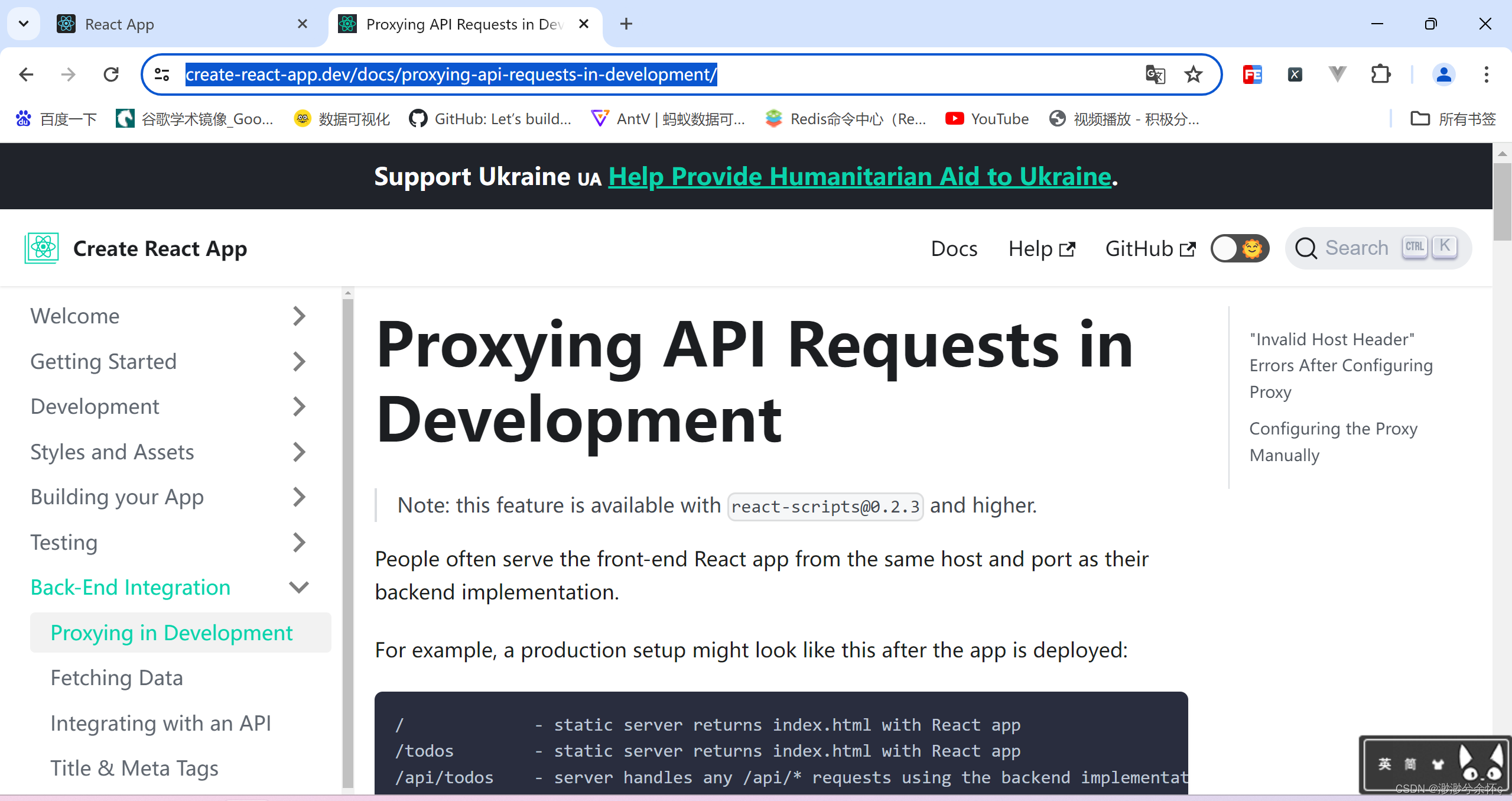一、跨域
如果违法了浏览器的同源策略,就会出现跨域问题,所谓同源(即指在同一个域)就是两个页面具有相同的协议(protocol),主机(host)和端口号(port)。
比如当前在域名为a的网站,向域名为b的网站发送ajax请求,或者在域名为a,端口为8080的前端页面,向域名为a,端口为9090的后端端口发送请求,就会出现跨域问题。
** 基本解决思路:**
- 发JSONP
- 服务器代理
- 可以安装一个浏览器插件
allow-control-allow-origin绕过同源策略。
等等。。。
主要解决方式还是**服务器代理**。
二、前端
这里以React项目为例,主要借助 http-proxy-middleware 模块。
** 安装模块 **
cnpm i --save-dev http-proxy-middleware # dev环境
** 创建setupProxy**
const { createProxyMiddleware } = require('http-proxy-middleware');
module.exports = function(app) {
app.use(
'/api',
createProxyMiddleware({
target: 'http://localhost:8080',
changeOrigin: true,
})
);
};
配置代理
以上面的代码为例,如果你的请求路径为/api/getUserInfo,会给你代理到:http://localhost:8080/api/getUserInfo,这个接口,根据自己的需求配置即可。
都弄好后,重启项目!!!
可以看下官网的说明:
Proxying API Requests in Development | Create React App

关于Vue如何解决跨域问题,这里附上一篇博客:
前端vue3解决跨域问题_为什么接口一经过vue3就跨域-CSDN博客
三、后端
以JAVA的SpringBoot框架为例:
使用@CrossOrigin注解
对想要允许跨域请求的接口,加上@CrossOrigin注解即可。
@PostMapping("/login")
@CrossOrigin
@ApiOperation("用户登录")
public ResultJson<LoginVO>login(@RequestBody UserVO user){
log.info("用户登录 {}" ,user);
String password = DigestUtils.md5DigestAsHex(user.getPassword().getBytes());
log.info("登录:用户提交的密码(加密后): {}",password);
User targetUser = userService.login(user.getEmail(), password);
if(targetUser == null){
log.info("邮箱或密码错误!");
return ResultJson.error("邮箱或密码错误!");
}
String token = null;
if(redisUtil.exists("token:"+user.getEmail()))
{
token = (String) redisUtil.get("token:"+user.getEmail());
}else{
//登录成功后,生成jwt令牌
Map<String, Object> claims = new HashMap<>();
claims.put("user", user.getEmail());
token = JwtUtil.createJWT(
jwtProperties.getSecretKey(),
jwtProperties.getTtl(),
claims);
//将token放到redis中去。
redisUtil.setex("token:"+user.getEmail(),token,3600 * 24 * 30);
}
String nowData = redisUtil.nowDate();
//将登录的useID放到对应日期的集合中去
redisUtil.sadd("time:"+nowData,targetUser.getId());
//过期时间一天
redisUtil.expire(nowData, 3600 * 24);
if (! redisUtil.sismember("time:"+nowData,targetUser.getId())) {
if(!redisUtil.hexists("msg:userLine",nowData))
redisUtil.hset("msg:userLine",nowData,1);
else
redisUtil.hincrby("msg:userLine", nowData,1);
}
//将最终的结果返回
return ResultJson.success(new LoginVO(token, targetUser));
}
添加全局过滤器
若项目中所有接口都允许跨域访问,可增加全局过滤器允许跨域访问。
import org.springframework.context.annotation.Bean;
import org.springframework.context.annotation.Configuration;
import org.springframework.web.cors.CorsConfiguration;
import org.springframework.web.cors.UrlBasedCorsConfigurationSource;
import org.springframework.web.filter.CorsFilter;
@Configuration
public class CorsConfig {
// 当前跨域请求最大有效时长。这里默认1天
private static final long MAX_AGE = 24 * 60 * 60;
@Bean
public CorsFilter corsFilter() {
UrlBasedCorsConfigurationSource source = new UrlBasedCorsConfigurationSource();
CorsConfiguration corsConfiguration = new CorsConfiguration();
corsConfiguration.addAllowedOrigin("*"); // 1 设置访问源地址,
corsConfiguration.addAllowedHeader("*"); // 2 设置访问源请求头
corsConfiguration.addAllowedMethod("*"); // 3 设置访问源请求方法,或设置为"GET", "POST", "DELETE", "PUT"
corsConfiguration.setMaxAge(MAX_AGE);
source.registerCorsConfiguration("/**", corsConfiguration); // 4 对接口配置跨域设置
return new CorsFilter(source);
}
}
在Web的配置类中
import org.springframework.context.annotation.Configuration;
import org.springframework.web.servlet.config.annotation.CorsRegistry;
import org.springframework.web.servlet.config.annotation.WebMvcConfigurer;
@Configuration
public class WebConfig implements WebMvcConfigurer {
// 当前跨域请求最大有效时长。这里默认1天
private static final long MAX_AGE = 24 * 60 * 60;
@Override
public void addCorsMappings(CorsRegistry registry) {
registry.addMapping("/**")
.allowedOrigins("*")
.allowedMethods("*")
.allowedHeaders("*")
.maxAge(MAX_AGE);
}
}
** 别忘了重启项目!!!**
参考:
Spring Boot项目中解决跨域问题(四种方式)_springboot 解决跨域-CSDN博客
四、Nginx反向代理
以Vue项目为例,打包后,可以使用Nginx进行部署,使用Nginx解决跨域问题的思路,和在前端解决的思路一致,都是把前端的请求路径代理到后端的接口。
server{
listen 80;
server_name localhost;
# 代理
location /api/ {
proxy_set_header Upgrade $http_upgrade;
proxy_set_header Connection "upgrade";
proxy_read_timeout 600s;
proxy_pass http://127.0.0.1:8080/;
}
# 前端项目部署
location / {
alias /docker/nginx/html/;
try_files $uri $uri/ /index.html;
index index.html index.htm;
}
}
以这段代码为例,比如一个请求:http:localhost:80/api/getUserInfo(这个监听的就是80端口),会代理到 http:localhost:8080/getUserInfo,从而解决跨域问题。
如有问题,请指出!
版权归原作者 鱼虾一整碗• 所有, 如有侵权,请联系我们删除。